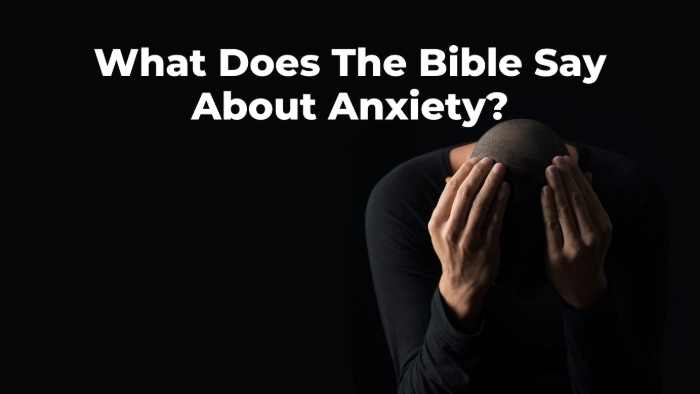What Does the Bible Say About Anxiety?

Feeling trapped in an endless cycle of worry and fear? Anxiety disorders like sleep deprivation and panic attacks seem to be all but common in this fast-paced, unpredictable world. It is a silent struggle that affects millions. Yet what does the Bible say about anxiety? Scripture speaks directly to the restless heart, offering profound hope and supernatural healing in your mind and body.
Imagine a life where the burdens of uncertainty no longer weigh you down. The Bible doesn’t dismiss your struggles—it meets you while you are in the eye of a storm. Like Jesus commanding Peter to step out of the boat and come to him on the water. God teaches you to cast your cares upon him because He cares deeply for you. 1 Peter 5:7
God’s Word not only identifies the root of anxiety but also how to rise above it. It teaches us to lean into His promises, surrender control and embrace a profound sense of peace that surpasses all understanding. Are you ready to explore what the Bible truly says about anxiety and discover a life anchored in divine calm? Let’s delve in.
Anxiety According to the Bible
MedlinePlus.gov defines anxiety as having feelings of fear, dread, and uneasiness. It might cause you to sweat, feel restless and tense, and have a rapid heartbeat. Anxiety, in a biblical sense, reflects the tension between human frailty and trust in God. Anxiety affects our soul, mind and body when we focus more on uncertainties rather than God’s promises.
A powerful example of anxiety in the Bible is found in Numbers 13-14, when the Israelites sent twelve spies to scout the Promised Land. God had already promised to give them the land, a place flowing with milk and honey (Exodus 3:8), but when the spies returned, their focus on the obstacles overshadowed their faith in God’s promise.
The spies reported that the land was indeed abundant, but ten of them emphasized that the people who lived there were powerful, and the cities were fortified and very large. Their anxiety grew as they described the inhabitants as giants while they were mere grasshoppers in comparison. This fear and anxiety spread like wildfire among the Israelites, causing them to grumble and despair.
This episode illustrates how focusing on the “giants” of life—obstacles, fears, and uncertainties—can lead to crippling anxiety and disobedience. It also underscores the importance of trusting God’s promises, even when circumstances seem hopeless.
What is the Root Cause of Anxiety?
The Psychological Cause of Anxiety
Anxiety can be from psychological factors like past trauma and childhood experiences. Those who grow up in unpredictable or unsafe environments may develop hypervigilance, a state of heightened awareness and alertness in which a person is constantly on guard for potential danger, even when there is little risk.
Cultural and Societal Influences
Unfortunately, modern culture and societal influences have amplified the conditions for anxiety. The constant push for productivity, the obsession with achievement, and the endless comparisons fueled by social media have created a breeding ground for insecurity.
The Spiritual Dimensions of Anxiety
In the Bible, anxiety is often depicted as a form of unrest in the soul. It reflects a lack of trust in God’s provision and care, leading to internal turmoil. Which paralyzes and distances us from Him. Anxiety is not just an emotional or mental state—it is and always has been a spiritual issue that needs addressing at its core.
A Broken Relationship with God
The root cause of anxiety traces back to humanity’s fall in the Garden of Eden. When Adam and Eve disobeyed God, sin entered the world (Genesis 3:14-19). This moment of separation from God introduced uncertainty, shame, and fear—anxieties that persist to this day. Humanity’s broken relationship with God lies at the heart of our anxious tendencies. It truly is the reason why we struggle so much with mental health and self-care.
The Burden of Self-Reliance and Control
At the core of anxiety is often a desire for control. People worry about outcomes, relationships, and the future because they long to predict and dictate their circumstances. When relying solely on yourself this creates a heavy burden that often leads to anxiety and feeling overwhelmed. Ultimately, worrying about what we cannot control is not only futile but also a rejection of God’s sovereignty.
The Spiritual Battle Behind Anxiety
As mentioned, anxiety is not just a mental or emotional struggle—it’s part of a larger spiritual battle. Ephesians 6:12 reminds us: “For our struggle is not against flesh and blood, but against the rulers, against the authorities, against the powers of this dark world and against the spiritual forces of evil in the heavenly realms.” The enemy uses fear and anxiety to distract and disconnect us from God, making spiritual vigilance essential in combating these attacks.
How to Overcome Anxiety Biblically
The Power of Prayer in Calming the Anxious Heart
Prayer is a transformative act that shifts our focus from problems to God’s power. When anxiety feels overwhelming, prayer provides a refuge, grounding us in His presence. Honest, heartfelt prayer invites God into our struggles, reminding us that if God is for us then who or what circumstance can prevail against us? (Romans 8:31)
Meditate on God’s Promises
Scripture is a wellspring of comfort for the anxious heart. Verses like Isaiah 41:10 (“Do not fear, for I am with you”) and Psalm 34:4 (“I sought the Lord, and he answered me; he delivered me from all my fears”) offer reassurance in times of worry. Regular meditation on God’s Word not only calms the mind but also renews it, aligning our thoughts with His truth.
Having Gratitude in Battling Anxiety
Gratitude is a powerful weapon against anxiety. When we practice thanksgiving, we shift our focus from what we lack to the abundance of God’s blessings. This act of acknowledgment fosters a heart of trust and contentment. Simple practices, like journaling daily gratitude or reflecting on answered prayers, can reorient the anxious mind.
Surrendering Control to God
Anxiety often stems from a futile attempt to control the uncontrollable. Jesus addresses this in Matthew 6:27: “Can any one of you by worrying add a single hour to your life?” True peace comes when we surrender our worries to God, trusting Him to direct our paths. Proverbs 3:5-6 reminds us: “Trust in the Lord with all your heart and lean not on your own understanding; in all your ways submit to him, and he will make your paths straight.”
Leaning on Community and Fellowship
The Bible emphasizes the importance of community in navigating life’s challenges. Galatians 6:2 calls us to “carry each other’s burdens.” Sharing our struggles with trusted friends or participating in corporate prayer not only lightens the load but also reinforces the truth that we are not alone.
Developing a Daily Practice of Faith and Peace
Overcoming anxiety requires intentionality. Building a daily routine that includes prayer, fasting, Scripture meditation, and gratitude fosters a spirit of peace. Small, consistent habits—like starting the day with devotionals or pausing for moments of silence—cultivate resilience and trust in God’s faithfulness.
Conclusion: Be Anxious For Nothing
Anxiety often feels like an inescapable storm, clouding our thoughts and stealing our peace. Yet, the Bible offers a profound remedy in Philippians 4:6-7: “Do not be anxious about anything, but in every situation, by prayer and petition, with thanksgiving, present your requests to God. And the peace of God, which transcends all understanding, will guard your hearts and your minds in Christ Jesus.” These verses are not a denial of life’s challenges but an invitation to trade worry for trust.
The key lies in surrender. Through prayer, we acknowledge God’s sovereignty, releasing our burdens to His capable hands. Thanksgiving shifts our focus from what troubles us to the blessings we often overlook, cultivating a heart of gratitude. In return, God promises a peace that surpasses human comprehension—a steadfast calm that guards both heart and mind.
This divine peace is not dependent on external circumstances but rooted in the unchanging nature of God. When we embrace the truth of Philippians 4:6-7, we are reminded that anxiety cannot coexist with trust in a faithful God. By placing our confidence in Him, we step into a life marked by tranquility and assurance, even amidst uncertainty. Rest in His promises, and be anxious for nothing.
